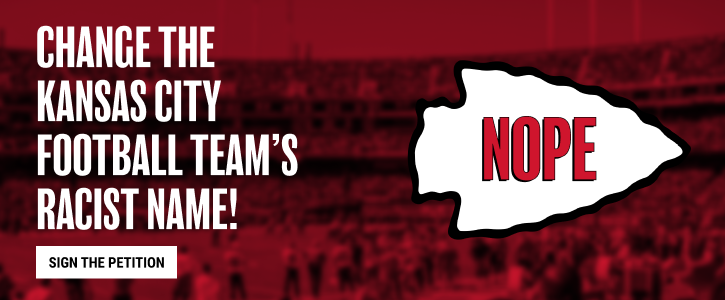20,000 signatures reached
To: Clark Hunt: Owner, Chairman, and CEO of Kansas City Chiefs
Change the Kansas City Football Team’s Racist Name and Imagery

The Kansas City football team name is rooted in a history of racist depictions of Native people in America. While the team ownership has tried to adjust, it's clear that it must adopt a new name to break away from this offensive colonialist history. As Kansas City plays for the Super Bowl championship, they should champion respect and dignity for all.
Why is this important?
There is a history of racist images, names, and tropes around sports teams—and fortunately, team after team is recognizing that and changing its ways. Football's Washington Commanders and baseball's Cleveland Guardians are two recent examples of major sports teams listening to fans and Native people, finally recognizing that they needed to change their names, imagery, and culture—doing so successfully.
It's time for Kansas City—with a team of stellar athletes heading to the Super Bowl—to do the same.
Native people are not mascots, they are people and are still here.
The Kansas City team knows it has a problem. Over recent years, it has adjusted its imagery, banned fans from donning war paint, and tried to stifle "war chants" in their stadium in their efforts to confront racist, misinformed, and offensive stereotypes. Yet these behaviors persist, amplifying the harm, oppression, and intergenerational trauma they cause. Leaders, historians, psychologists, and social scientists have concluded that “Native mascots are part of a much larger web of phenomena that contribute to oppression faced by Native Americans and thus it seems clear that these mascots should be eliminated.” That’s why it’s so important to consult Native leaders and organizations who have been at the forefront of these fights.
Kansas City has a rich and diverse history—and now it has a nationally-recognized football team. Words have power. Symbols have power. All racist imagery—the team's name, logo, culture and rituals—must be changed to show respect for Native peoples. It's time to stop this racist cultural appropriation by sports teams.
It's time for Kansas City—with a team of stellar athletes heading to the Super Bowl—to do the same.
Native people are not mascots, they are people and are still here.
The Kansas City team knows it has a problem. Over recent years, it has adjusted its imagery, banned fans from donning war paint, and tried to stifle "war chants" in their stadium in their efforts to confront racist, misinformed, and offensive stereotypes. Yet these behaviors persist, amplifying the harm, oppression, and intergenerational trauma they cause. Leaders, historians, psychologists, and social scientists have concluded that “Native mascots are part of a much larger web of phenomena that contribute to oppression faced by Native Americans and thus it seems clear that these mascots should be eliminated.” That’s why it’s so important to consult Native leaders and organizations who have been at the forefront of these fights.
Kansas City has a rich and diverse history—and now it has a nationally-recognized football team. Words have power. Symbols have power. All racist imagery—the team's name, logo, culture and rituals—must be changed to show respect for Native peoples. It's time to stop this racist cultural appropriation by sports teams.

